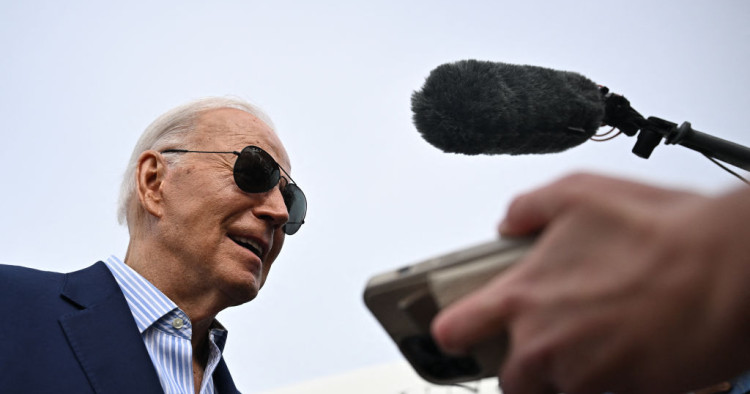Contents:
- Gaps between Biden and Netanyahu surface in public
- No Gaza deal before Ramadan but shared concerns do facilitate Israel-Arab coordination
- Egypt’s economy gets a second chance. Again
Gaps between Biden and Netanyahu surface in public
Brian Katulis
Senior Fellow for U.S. Foreign Policy and Senior Advisor to the President

-
President Joe Biden and Israeli Prime Minister Benjamin Netanyahu have voiced different views about tactics and operations in the Israel-Gaza war as concerns about the humanitarian crisis in Gaza increase and worries about the lack of a clear end game grow.
-
Amid heightened tensions during Ramadan and the lack of success thus far of months-long diplomatic efforts on Gaza, the Biden administration is making some tactical shifts in its policies on the war, but its overall strategic approach for the region appears unlikely to change dramatically.
President Joe Biden has voiced doubts about how Israeli Prime Minister Benjamin Netanyahu is handling the Gaza war, saying that Netanyahu may be “hurting Israel more than helping Israel” in an interview this weekend. This prompted Netanyahu to respond in public, rejecting the criticism. This exchange of different views via the media highlights gaps that have been emerging for several months now in private conversations between the leaders and their teams, most of which have centered on tactical differences in policy approaches over how Israel is handling the war against Hamas in Gaza.
Growing concerns about the worsening humanitarian crisis in Gaza and fears of a widespread famine among Palestinians prompted the United States to begin airlifting aid into the coastal strip and making plans for a floating US military port to deliver additional assistance, a project that could take another two months to complete. Just last week, Vice President Kamala Harris met with Israeli war cabinet minister Benny Gantz and voiced worries that Israel did not have credible plans for its military operation in Rafah in southern Gaza, particularly when it comes to protecting civilians and addressing the basic needs of ordinary Palestinians caught in the middle of the fight between Israel and Hamas.
These differences are coming to the fore as it remains unclear if intensified diplomatic efforts to secure another cease-fire and hostage release will succeed. The United States, Israel, Egypt, and Qatar had hoped to achieve a cease-fire before the start of the holy month of Ramadan, but it does not appear that Hamas is prepared to accept the terms offered in the latest round of negotiations, though this could shift at any moment.
The public rift between Biden and Netanyahu is likely to continue as long as the United States and Israel are not synchronized in policies on some key short-term issues such as humanitarian aid and civilian protection for Palestinians in Gaza as well as important long-term questions centered around how the conflict might end. The Biden administration has reiterated a long-standing US position put forward by Republican and Democratic administrations for decades calling for a two-state solution to the Israeli-Palestinian conflict. The current Israeli government has ministers who reject a two-state concept and has resisted defining a clear end game for the war in Gaza. Another additional dimension animating this public rift are domestic politics inside the United States and Israel, each with their own timeclock and complications.
Nevertheless, in the bigger picture, the United States and Israel seem unlikely to abandon their broader regional security strategies, despite these recent divergences. The five goals the Biden administration set for itself in the early weeks of the war remain very much in place:
- Support Israel's self-defense and objective of eliminating threats posed by Hamas and other groups in the Gaza Strip;
- Secure the safe return of hostages;
- Prevent a wider regional war;
- Protect civilians and respond to a growing humanitarian crisis in Gaza; and
- Maintain strong working relationships with Arab countries and others involved in managing the fallout and planning for the future.
President Biden has reiterated that the United States will keep helping Israel defend itself. In the broader regional landscape, America and Israel continue to face common threats from Iran and its network of partners, like Hezbollah in Lebanon and the Houthis in Yemen. The Biden administration appears to be making tactical shifts in reaction to emerging dynamics inside of the Gaza Strip, especially the worsening humanitarian situation, rather than domestic political pressures, and these shifts do not yet appear to represent a strategic change in America’s overall approach to the region.
Follow: @Katulis
No Gaza deal before Ramadan but shared concerns do facilitate Israel-Arab coordination
Nimrod Goren
Senior Fellow for Israeli Affairs

-
Diplomatic efforts to reach a pause in fighting in Gaza and the release of Israeli hostages did not result in an agreement before the start of Ramadan, as had been hoped, but negotiations are continuing.
-
In the meantime, concerns over a further flare-up during the holy month and the pressing humanitarian needs in the Gaza Strip have led Israel and several Arab countries to increase their coordination, facilitating the entry of aid.
The Muslim holy month of Ramadan began without a pause in fighting in Gaza or an agreement on the release of Israeli hostages. Things had been expected to go differently. Over the past few weeks, intense mediation efforts took place in France, Egypt, and Jordan, led by the US, Egypt, and Qatar. "It’s in the hands of Hamas right now. Israelis have been cooperating," said President Joe Biden early last week, as Ramadan drew near and in parallel to his growing criticism of Israeli Prime Minister Benjamin Netanyahu. Nevertheless, the door is not shut and an agreement of sorts could still be reached during Ramadan.
Negotiations are continuing, including on a new formula proposed by Central Intelligence Agency Director William Burns of a two- to four-day truce, during which Hamas will provide a list of Israeli hostages and their condition. Multiple actors want a pause during Ramadan, as it would change the momentum in Gaza (even if only temporarily), help contain tensions around Jerusalem’s al-Aqsa Mosque, ease to prevent a spillover of the conflict to the West Bank and Jordan, and aid US diplomatic efforts toward de-escalation between Israel and Hezbollah. A six-week pause (as initially discussed) starting later in Ramadan, rather than at its onset, would also cover the Jewish holiday of Passover, which is an Israeli interest.
While diplomatic efforts continue, political power struggles within the Israeli government may also impact how Ramadan goes. Far-right Minister of National Security Itamar Ben-Gvir sought to further restrict Muslim access to al-Aqsa Mosque during the month, but was overruled by Netanyahu, who also decided that only he (and not Ben-Gvir) could authorize police entry into the mosque's compound. Nevertheless, the first night of Ramadan already saw some clashes between the Israeli police and worshippers, in a worrying sign of where things might be headed.
Concerns over heightened tension during Ramadan, while still not leading to a pause in fighting, have catalyzed increased coordination between Israel and its Arab neighbors. This is playing out primarily in the humanitarian field, where Arab countries are stepping up their aid to Palestinians in the Gaza Strip, a process that requires coordination with Israel. The United Arab Emirates is sending a ship with a significant amount of humanitarian aid, while Egypt, Jordan, and now even Morocco are making airdrops of aid into Gaza. The humanitarian issue, which is the focus of international criticism of Israel, also serves as a glue that binds Israel and Arab countries closer together and enables constructive interaction. This is in addition to Israeli-Arab security coordination, which may be taking place behind the scenes, and to Arab needs from Israel that are still being pursued despite the war, such as Jordan's recent request to extend their water deal.
The war in Gaza showcases the resilience, complexity, and multi-faceted nature of Israel-Arab relations. The fact that these relations continue, despite all the limitations and hardships, even in the midst of a prolonged war, is a positive sign. It also underscores the extent of potential future Israel-Arab cooperation that could be developed once a more moderate Israeli leadership takes office and new regional realities begin to take shape, after the war is finally over.
Follow: @GorenNimrod
Egypt’s economy gets a second chance. Again
Mirette F. Mabrouk
Senior Fellow and Founding Director of the Egypt program

-
Egypt could see as much as $20 billion in external financing on the back of the new IMF loan.
-
While Egypt can hardly be blamed for the external shocks that rattled its economy, those shocks hit especially hard because the economy was simply not fortified appropriately.
Egyptians seem to have been holding their breath for forever, in collective frustration. Over the past two years or so, they have watched helplessly as their economy took one battering after another. The culprits were a mix of external forces beyond their government’s control, like COVID and the Ukraine war, and internal complications that were largely self-inflicted, the result of longstanding and long-ignored structural flaws. It has been especially bad over the past year, during which a shortage of hard currency meant that the country struggled to import essential goods and pay off its mounting external debt. It didn’t help people that there were two parallel markets: an official one, in which the bank rate was EGP 30.9 to the dollar, and a black market, in which the value of the pound plummeted to almost EGP 70 to the dollar — assuming you could find hard currency at all.
On March 6, the country breathed a tremulous sigh of relief. The Central Bank of Egypt (CBE) finally floated the pound — the fourth de-facto devaluation since the Russian invasion of Ukraine in early 2022 — and it gradually declined, settling at EGP 50 to the dollar. As of March 11, it was still holding steady at just under EGP 49.5 to the dollar. The CBE also hiked interest rates by an unprecedented 600 basis points.
The moves came in the wake of a revamped International Monetary Fund (IMF) deal with Egypt announced the same day. The IMF loan has been increased to $8 billion, up from the original $3 billion early last year, and Minister of Finance Mohamed Maait later said that he expected total hard currency inflows on the back of the loan to come to $20 billion, including $11 billion from the World Bank, the EU, the UK, and Japan, not to mention $1.1 billion still in discussion for climate financing under the Fund’s Resilience and Sustainability Facility.
Of course, that had been the original idea, after an IMF loan was agreed upon early last year, but the additional funds failed to materialize. Things do seem to be moving in a better direction this time around, though. Egypt has already signed a major investment deal with the UAE, worth $35 billion, to develop the Ras al-Hikma Peninsula, west of Alexandria. It’s one of the largest deals of its kind. The World Bank has since committed to $3 billion in funding and the ripples have been positive. Foreign investors have returned to Egypt’s Treasury bill auctions after watching from the sidelines for many months, and Morgan Stanley now expects Moody’s to raise Egypt’s credit rating from Caa1 to B3.
Nobody should be releasing balloons any time soon, though. The IMF chief of mission, Ivan Holler, while positive on the deal and the outlook for Egypt, noted that “the loan will seek to maintain debt sustainability, restore price stability, and reinstate a well-functioning exchange rate regime, while continuing to push deep structural reforms forward to boost private-sector-led growth and job creation.”
While Egypt can hardly be blamed for the external shocks that rattled its economy, those shocks hit especially hard because the economy was simply not fortified appropriately. The fixes are not terribly complicated — at least in theory; practical application is an entirely different matter — but government after government has failed to implement them due to political considerations. One of Egypt’s most serious vulnerabilities, for example, was its reliance on hot money, so the return of investors to its Treasury bill auctions is very much a mixed blessing. Egypt has been given another reprieve. It remains to be seen whether it will take advantage of it, or simply repeat its mistakes.
Follow: @mmabrouk
Photo by JIM WATSON/AFP via Getty Images
The Middle East Institute (MEI) is an independent, non-partisan, non-for-profit, educational organization. It does not engage in advocacy and its scholars’ opinions are their own. MEI welcomes financial donations, but retains sole editorial control over its work and its publications reflect only the authors’ views. For a listing of MEI donors, please click here.













